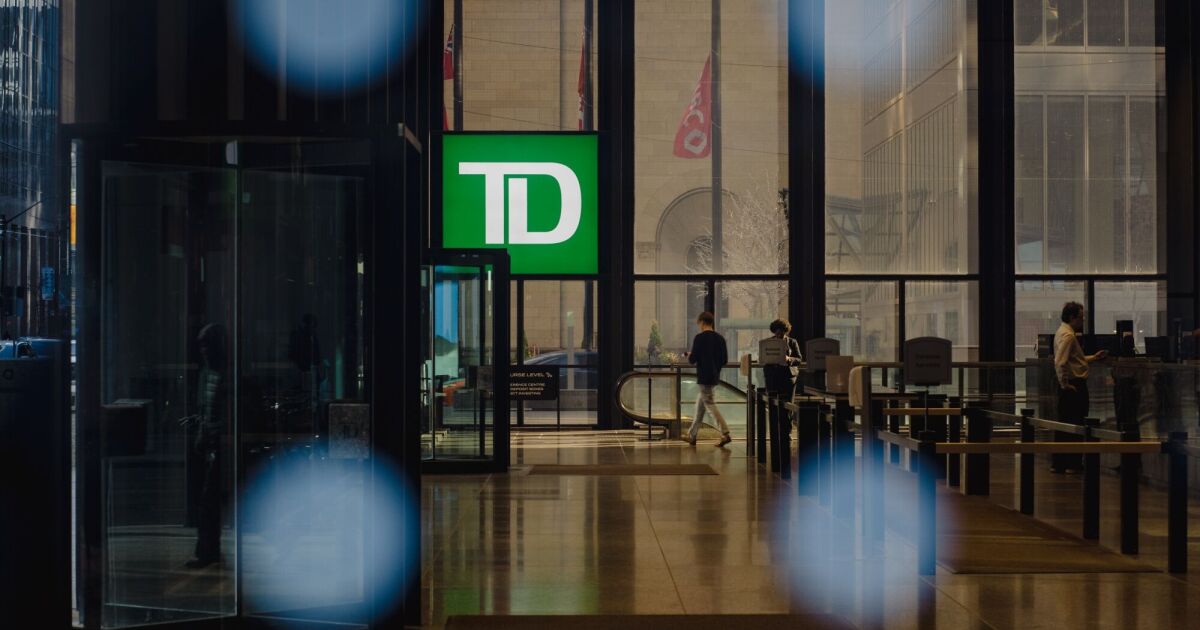
TD Bank Group executives are struggling to answer questions from Wall Street about whether the company's ambitious growth plans in the United States will be thwarted by its sizable anti-money-laundering troubles.
In a quarterly earnings call with analysts on Thursday, TD executives vowed to overhaul safeguards against money laundering in the bank's U.S. division. But they couldn't give firm guidance on whether the Canadian company's U.S. branch expansion plans, announced last year, are now mostly off the table.
"I know that there's a lot of questions about what we can and cannot do," Leo Salom, who heads TD's U.S. retail bank, said on the company's earnings call. "The one thing that I will commit to this group is as soon as we're in a position to provide greater clarity on those, we will certainly do that."
The comments highlight the massive regulatory uncertainty facing the Toronto-based bank, whose U.S. arm bills itself as America's most convenient bank. The bank has set aside $450 million to begin covering its legal tab and spent $500 million to overhaul systems that proved convenient to money launderers.
Executives did not say Thursday
Investors are also concerned about a "stagnation of the U.S. franchise" as TD works out of its regulatory troubles, Bank of America analyst Ebrahim Poonawala said during the earnings call.
Big and regional banks are expanding their footprints throughout the growing Southeast U.S., Poonawala noted. TD had planned to grow in that region by acquiring Tennessee-based First Horizon Corp. But the deal fell through last year,
After the First Horizon acquisition fell through, TD laid out a plan to open 150 new U.S. branches by 2027. Executives declined to say Thursday whether they're pulling back that plan.
Leo Salom, who heads TD's U.S. retail arm, said when asked about the company's branch plans that it is "deliberately pacing" its expansion, and that TD will focus more on its "digital and mobile strategies." He declined to provide more clarity when asked whether that implied TD isn't able to open more branches, which TD calls "stores."
"I'm not making the claim that we cannot grow the stores," Salom said. "But I also want to be very clear that we are in the midst of discussion with regulators, and I don't want to prejudice any of those conversations at this point."
The bank has a "strong franchise" in the United States, Salom said, pointing to its continued momentum on loans, profitability and expense cutting.
Analysts gave TD credit for what they described as its strong financial performance in the second quarter. There was "not much more that could have gone right for TD in the quarter," Jefferies analyst John Aiken wrote in a note to clients. But the regulatory "overhang will likely persist for some time," he added, making the bank's quarterly earnings less important.
"While the results in the quarter were strong, we continue to believe that TD's outlook hinges on the uncertainty surrounding the U.S. regulatory investigation, its financial implications and its impact on TD's ability to grow in its important U.S. geography," Aiken wrote.
Investors will "remain frustrated by management not being able to provide additional disclosures" until its U.S. regulatory investigations are over, he added.
TD's stock price fell more than 2% on Thursday.
During the company's earnings call, CEO Bharat Masrani acknowledged severe lapses in how TD protects against criminals using the bank for money laundering.
"It's unfortunate that in this one instance, we fell short," Masrani said. "We are in the process of fixing it and we will fix it."
But he insisted that the bank is focused on an overhaul in the U.S. division where those lapses occurred — disputing at least certain parts of a
In that article, The Global and Mail reported that Canadian bank regulators are requiring TD to make compliance fixes. A more sprawling inquiry in Canada would raise the risk of further penalties.
Masrani said that The Globe and Mail report "contains inaccuracies" and that TD's discussions with its home-country regulators are part of "our normal course of business."
Ajai Bambawale, the bank's chief risk officer, said the "main issue we're dealing with" is shortcomings in its U.S. anti-money-laundering program. The lessons that TD is learning there are "going to benefit the global program," Bambawale said.
"The dialogue which is referenced in the article — the dialogue with regulators actually happens every day," Bambawale said.
The bank is "owning the issue" and acknowledging that its U.S. division "did not pick up things it should have picked up," Bambawale said.
"There were some procedural weaknesses in the U.S. that caused bad actors to exploit us," Bambawale said. "And we were also disappointed that some of our colleagues didn't follow our code of ethics."
In a May 2 article, The Wall Street Journal
"This is not a problem here at the enterprise level," Bambawale said Thursday.
The bank is continuing to cooperate with law enforcement to prosecute criminals who used TD, and it has shared any information "even when it demonstrated our weaknesses," Masrani said.
Masrani also said that TD has invested some $500 million to improve its anti-money-laundering systems, in order to ensure that it can adequately counter "the growing risk from bad actors around the world."



